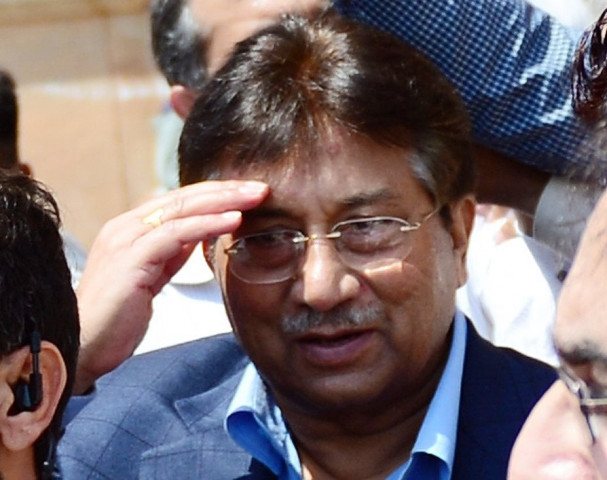Treason trial: Musharraf’s bailable arrest warrant issued
Three-judge bench rejects former military ruler’s request to travel abroad for treatment.

Former president General (retd) Pervez Musharraf. PHOTO: AFP
The special court constituted to try the former military ruler, Pervez Musharraf, for high treason on Friday discarded his plea to travel abroad for medical treatment.
After the rejection of Musharraf’s review petition by the Supreme Court against its July 31, 2007 verdict a day earlier, the three-judge bench issued a bailable arrest warrant for Musharraf in the high treason case.
The special court – headed by Justice Faisal Arab – issued a seven-page order which stated, “We are of the view that no reasonable excuse has been offered to justify the failure of the accused to appear before this court, therefore, there is no alternative except to issue a bailable warrant of arrest for the accused subject to executing a bond in a sum of Rs2,500,000 with one surety in the like amount.”
The court added that the warrant shall be sent to the inspector general of Islamabad police to get it served and submit its compliance report on February 7.

The court also cited reasons for rejecting Musharraf’s application seeking exemption from personal appearance as well as permission to fly abroad for his treatment at a medical facility with doctors of his choice in the United States.
“It is not maintainable before this court because the jurisdiction of the special court is confined within the limits prescribed under the High Treason (Punishment) Act 1973 and Criminal Law Amendment (Special Court) Act XVII of 1976 read with provisions of the Criminal Procedure Code as already decided by this court vide order dated 10.01.2014. Though the special court comprised three judges of the high court, it does not possess power of judicial review of administrative actions as available to a high court under the provisions of Article 199 of the Constitution of Islamic Republic of Pakistan 1973.”
The court also observed that it is an admitted position that the Sindh High Court had already rejected Musharraf’s plea for the removal of his name from the Exit Control List on December 23 last year.
It also reiterated that the contents of the AFIC medical board report evidence that it imposes no restrictions on the movement of the accused to an extent which would prevent him from appearing before this court.

A senior member of Musharraf’s legal team said that they were expecting this decision from the special court in light of the dismissed review petition.
“I feel it is the outcome of the Supreme Court’s decision to reject our client’s review petition against July 31, 2009. We committed the biggest mistake by not accepting the SC offer regarding its direction to the special court for deciding the high treason case on merit without being prejudiced to its judgments,” he said.
Meanwhile, another lawyer Chaudhry Faisal Hussain said the court’s order is beyond understanding because while it accepts the contents of the medical report and rejects the prosecution’s objections over it, it has issued an arrest warrant for Pervez Musharraf.
He said the team is studying the order and will soon challenge it in the superior courts if the lawyers deem it appropriate.
Regarding the medical board’s report, the court said, “It becomes apparent that in the absence of any such restriction imposed by the doctors, no reasonable excuse exists to justify the failure of the accused to appear before this court. The doctors in their medical report have not found it appropriate to impose any restriction on his movement. This by itself implies that no such advice was given to the accused.”
It further said that the accused has been in the hospital for a month and so far has not undergone coronary angiography at the AFIC. It adds that AFIC itself claims that it has a state of the art tertiary cardiac care facility with highly qualified heart specialists and is also ISO certified. It also claims that it performs about 1,600 surgeries a year of which 80% are open heart surgeries.
“The doctors in their medical report have narrated the risks of not undertaking the procedure of coronary angiography. If at all the accused is suffering from any heart ailment, we have not imposed any restriction whatsoever on his getting medical treatment, nor does he require our permission to undergo suggested coronary angiography as he is not in prison.”
Published in The Express Tribune, February 1st, 2014.



















COMMENTS
Comments are moderated and generally will be posted if they are on-topic and not abusive.
For more information, please see our Comments FAQ